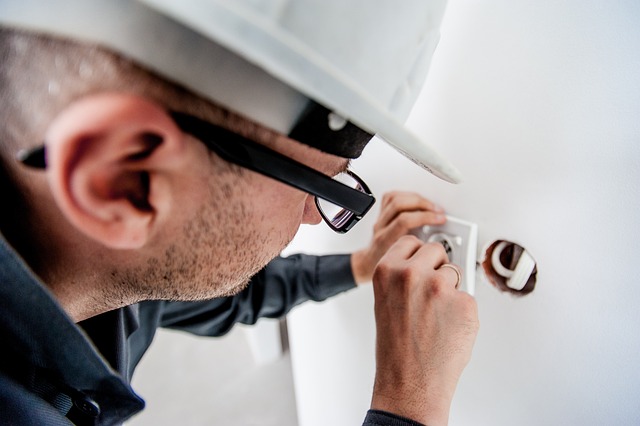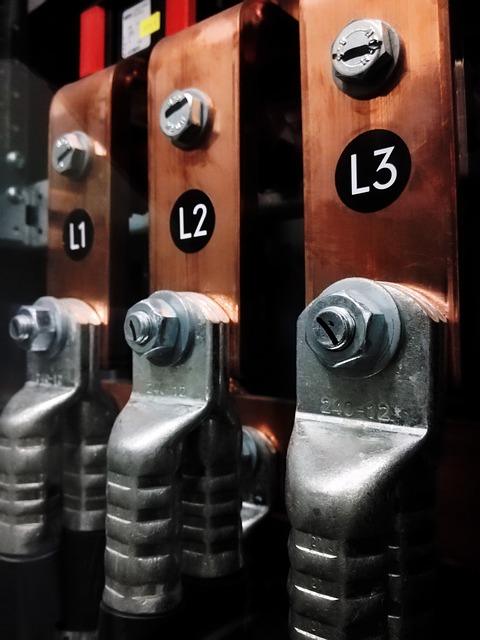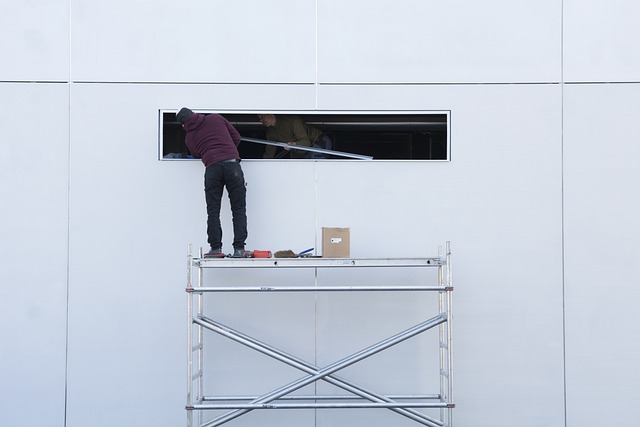Electricians play a vital role in new constructions and renovations, ensuring safe and efficient electrical wiring systems tailored to unique project needs. They master complex networks of cables, conduits, and fixtures, select appropriate wire gauge, and ensure proper grounding using materials like copper and aluminum conductors. Adhering to national codes and local building standards, electricians install LED lighting, smart home automation, and diverse connectors while mitigating hazards and avoiding future repairs. Hiring a licensed electrician is crucial for compliance, safety, and functionality in any construction project.
“Electrical wiring is a critical component in new constructions and renovations, requiring skilled professionals to ensure safety and code compliance. This article delves into the intricacies of electrical wiring systems, highlighting common types used in modern builds and the importance of adhering to local regulations.
We explore the pivotal role of certified electricians, from obtaining permits to utilizing specialized tools for accurate installations. Additionally, we break down the step-by-step installation process, covering box placement, cable routing, and connection techniques, offering valuable insights for both professionals and aspiring DIY enthusiasts.”
- Understanding Electrical Wiring Systems
- – Types of electrical wiring: Overview of common types used in new constructions and renovations.
- – Code requirements: Discussing local building codes and regulations for electrical installations.
Understanding Electrical Wiring Systems

Understanding electrical wiring systems is a cornerstone for any electrician undertaking new constructions or renovations. Electrical wiring, at its core, involves the intricate network of cables, conduits, and fixtures that facilitate the distribution of power within a structure. These systems range from simple residential setups to complex commercial infrastructures, each requiring specific considerations in terms of voltage, amperage, and safety standards.
Electricians must be adept at deciphering blueprints, identifying suitable wire types for different applications, and adhering to national electrical codes. This involves selecting the right gauge wires for lighting, outlets, and appliances, as well as ensuring proper grounding and shielding to prevent electrical faults and enhance safety. Proficiency in these areas is crucial for installing durable, efficient, and secure electrical wiring systems that meet the unique demands of each project.
– Types of electrical wiring: Overview of common types used in new constructions and renovations.

In new constructions or renovation projects, electricians play a pivotal role in installing electrical wiring that ensures a safe and efficient power distribution system. Common types of electrical wiring used in such scenarios include copper and aluminum conductors. Copper is widely preferred due to its excellent conductivity, durability, and resistance to corrosion, making it ideal for both residential and commercial settings. Aluminum wiring, on the other hand, is lighter and more affordable but requires specific considerations for proper grounding and insulation to prevent overheating.
Modern electrical wiring systems also incorporate advanced technologies such as LED lighting integration and smart home automation. Electricians must be adept at handling these complexities, ensuring that the wiring meets local building codes and safety standards. They use a variety of connectors, switches, and outlets tailored to specific applications, from general lighting to specialized equipment and appliances. This meticulous installation process forms the backbone of any well-functioning modern construction or renovation project.
– Code requirements: Discussing local building codes and regulations for electrical installations.

When installing electrical wiring in new constructions or renovations, adhering to local building codes and regulations is paramount. These guidelines, enforced by building departments, ensure safety and functionality. Every region has its own set of standards, covering aspects like wire types, voltage levels, grounding mechanisms, and panel placements. For instance, some areas mandate specific gauge wires for particular circuits, while others have strict requirements for GFCI (Ground Fault Circuit Interrupter) outlets in kitchens and bathrooms.
Hiring a licensed electrician is crucial to navigating these codes effectively. These professionals are not only trained in the latest installation practices but also have in-depth knowledge of local regulations. They can help ensure that your electrical system meets all necessary safety standards, preventing potential hazards and costly repairs down the line.
When it comes to new constructions or renovation projects, hiring a qualified electrician is paramount. Understanding the various types of electrical wiring systems and adhering to local building codes ensures safe and efficient installations. Whether it’s copper wiring for its durability or modern alternatives catering to specific project needs, proper electrical wiring is a cornerstone of any successful construction endeavor. Relying on expert electricians guarantees not just compliance with regulations but also long-lasting, reliable power distribution.
